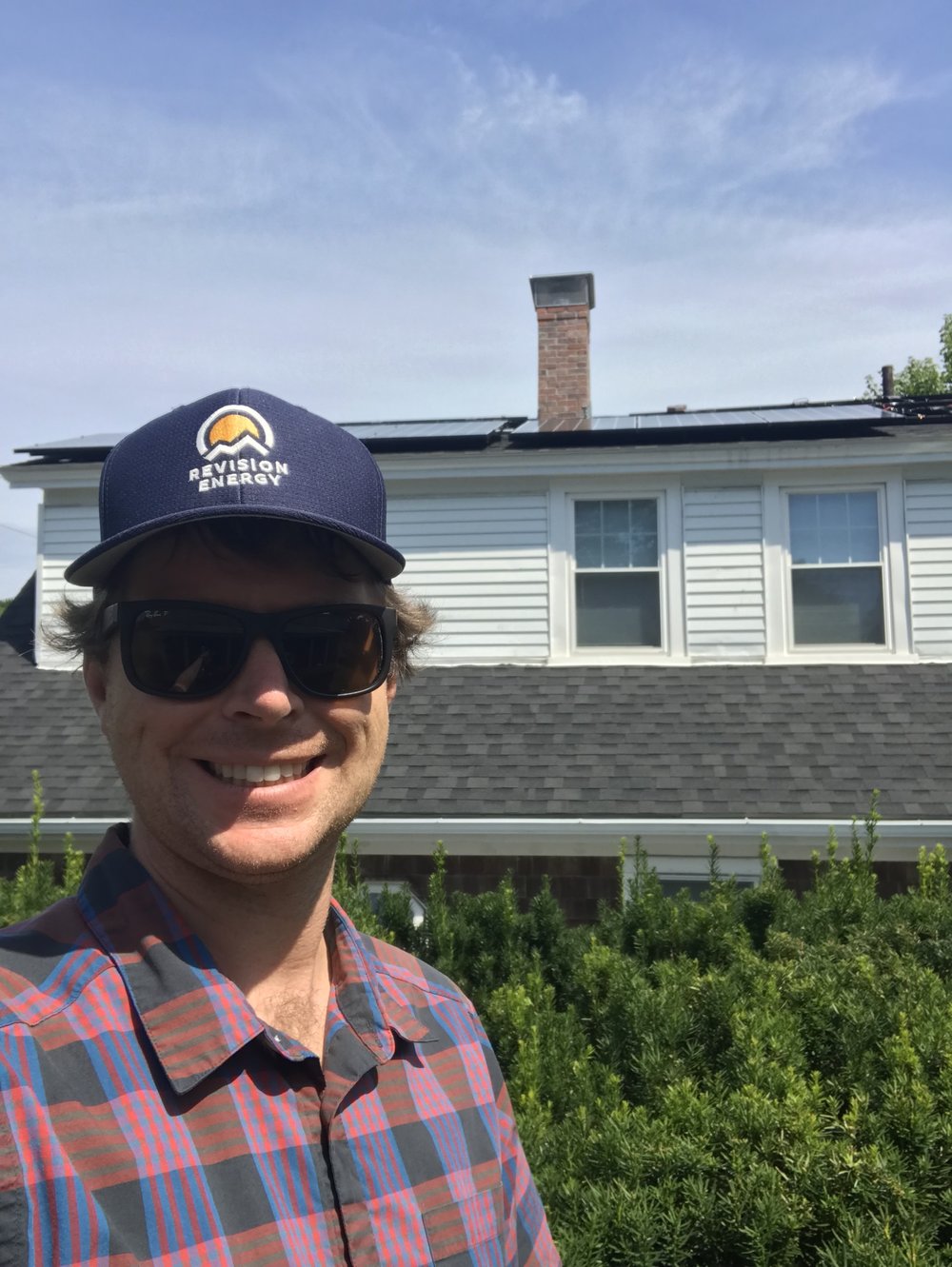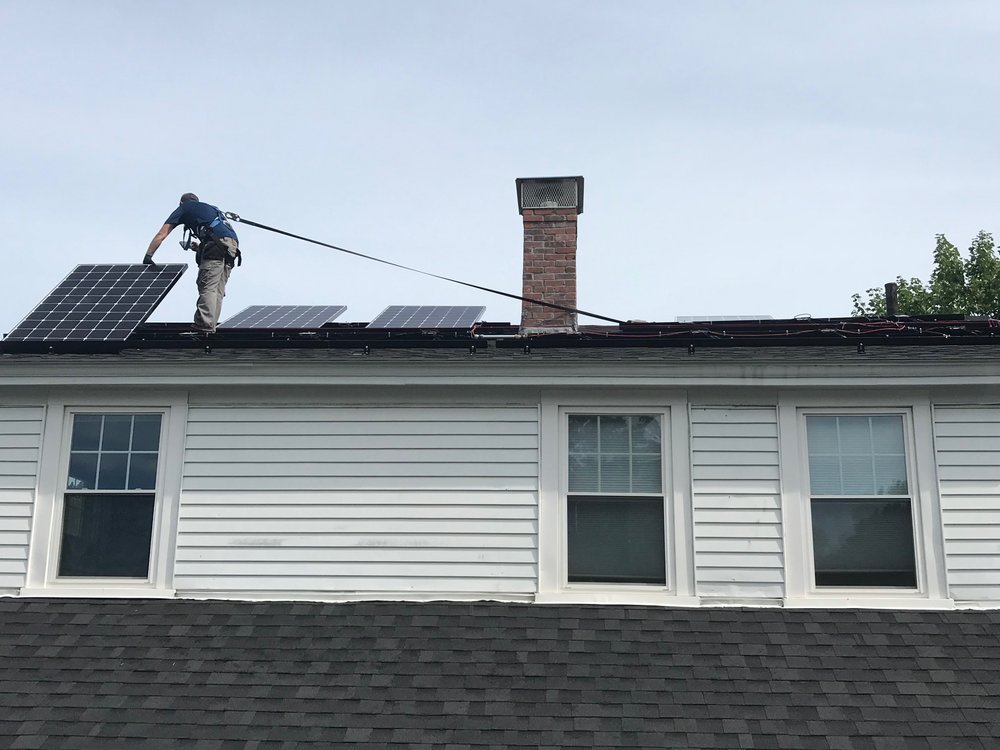Getting smart about energy use means going beyond solar – you need to look at the consumption side as well, especially in a drafty old New England house that depends on expensive fuel oil for heating and hot water. That’s why Barrett Miles and his fiancée, both first-time homeowners, and are taking major steps to upgrade their energy efficiency through a whole-home upgrade — some of which will be financed with solar loans and home improvement loans through Mosaic’s platform. And, as he and his fiancée are discovering, these efficiency improvements also deliver a lot of value beyond just savings on their utility bills.
(Although the $2000 in annual savings they’re expecting on electric and heating bills is a big, big plus!)
We spoke with Barrett about his whole-home upgrade experience and we hope it inspires other homeowners to embark on their own energy-efficient home improvement journeys!
 A happy ReVision Energy (and Mosaic) customer!
A happy ReVision Energy (and Mosaic) customer!
When and why did you decide to go solar yourself?
So, I’m a brand new, first-time homeowner, but I knew from my second job in distribution that I was pretty fired up on going solar. And when my fiancée and I were looking at homes in southern New Hampshire, I saw our [current] house and thought “This home is 180 degrees due south… It’s a perfect solar home!” That was a criteria for me – I don’t know if it was so much on her radar – but this home fit the bill perfectly despite being 90 years old, it’s just perfectly sited for solar.
But it ended up being about a lot more than going solar, right?
We didn’t really know what we were getting into in terms of an energy efficient whole-home upgrade until we got in there and spent the winter. We burned about 900 gallons of oil for about $1900! And that’s in part because I was heating my hot water off of my furnace – the boiler ran steam through the pipes to heat the house as well as the hot water for our taps. It’s kind of an antiquated system, very inefficient and unfortunately carbon intensive. So even in summer, the non-heating season, this home would be burning about 30 gallons of oil.
So we had a Mosaic partner, ReVision Energy, out to our home, and they gave us 3 proposals: a proposal for PV on the roof, the heat pump hot water heater in the basement, and heat pumps to heat the home. We elected to go with the heat pump hot water heater first, since that was the lowest cost, lowest hanging fruit project. And our hot water was intermittent, it was spotty, because you would use the water in the lines and then wait for the boiler to kick on… so the heat pump hot water heater was as much a comfort decision as an environmental decision.
And there was a rebate available – we got a $600 rebate on the heat pump hot water heater, which gives us a 3 year payback on that project alone. That went in in March, and we noticed immediately that the hot water was more consistent. It also dehumidifies the basement, which is a problem we have in New England, so there are multiple benefits. And then at the end of April, once it got warm enough to turn off the furnace, I was able to flip the switch on the oil boiler and basically turn off my oil use from April and probably won’t have to flip it on again until October.
So when’s the new electric heating system going in?
We decided to hold off on the heat pumps for the house this year. That’s a roughly $5,000 -$7,000 investment per unit, although we can support that with a home improvement loan through Mosaic – so we’ll probably do that in the next year or two, but we’re trying to space the projects out.
 Barrett’s new, efficient, electric heat pump hot water heater.
Barrett’s new, efficient, electric heat pump hot water heater.
Did you take any other energy efficiency steps?
Yeah, we didn’t even talk about the insulation work we did! The first thing I did when I moved in was switch everything to LED light bulbs, that was the lowest hanging fruit, lowest cost project. Then, coming off last winter when we burned a lot of oil, I knew we had to take additional insulation and efficiency measures. ReVision recommended a local energy efficiency company, so I had them out to do a blower door test and an audit on my home to check for leaks.
They found there was a significant amount of air sealing and insulation work that could be done – and my home qualified for a utility rebate because we burned an exceptional amount of oil. So, we got them under contract, and in June had them out to do 12” of cellulose in the attic, 3” of spray foam in the basement, and a lot of air sealing. Which only cost me about $2,200 out of pocket, the utility kicked in another $2,200, and the expected payback on that is 4 years. That’s projected to save more than 100 gallons of oil and over 3,000 pounds of CO2 emissions annually.
This is something I talked about even when I sold solar – I said “That’s great, you’re making the decision to go solar, but it’s also a good time to look at the consumption side of your home and optimize the rest of your energy.” I think too often we use, use, use, but we don’t look at how to reduce.
OK, all this efficiency stuff is incredibly important, but that reminds me – we still haven’t talked about solar yet! Tell me about that part of the whole-home upgrade; walk me through the process.
So like I said, we got our proposal from ReVision in November, right around Thanksgiving. And then there was a bit of back and forth on the solar system design, making decisions about system details. I needed to make sure that it fit my monthly budget, and I had some specific ideas about my solar project – I had been waiting so long to do this! – so ReVision worked with me on a customized design for my home.
And then, we knew we were going to finance with Mosaic, but it was a question of “Do I do a 10 year loan with a triple digit monthly payment or do I do a 15 year and have a double digit payment?” Which to me is a no-brainer – $99 a month is just like a cell phone bill. It’s also a lot closer to what my current electric bill is today, and I have the flexibility to pay it off sooner if I want to. So that was the business case.
Tell me about the install – what can people expect when they go solar?
It was a two day install for a 4.57 kW, 15 panel system. The crew showed up on Monday, very low key – it wasn’t invasive at all, they were primarily on the outside of the home, on the roof, and in the basement, so I was actually able to continue working from home for that period of time. They got all the racking and the flashing and the inverter and the wiring done on day one, then on day two they came back, installed the panels themselves, and completed wiring.
And that was it – two days, and everything was up. The system got inspected, passed inspection, and now I’m just waiting for the utility company to swap my meter. And when they do, I’ll be able to turn this thing on, get clean energy on my roof, and monitor everything from the palm of my hand with my phone!
 Day 2: The Roof Day.
Day 2: The Roof Day.
Are you the first solar home in your neighborhood?
It’s still very much a rare sighting, but it’s starting to become more commonplace in New Hampshire. I think in there are about 11,000 residential solar installations statewide, which is still pretty small considering it’s a state of over 1 million people.
As we did this project I realized I was not only doing for myself, and the clean energy mission and vision and values reasons, but also to normalize solar – I want people to see it as something that’s not out there, it’s not strange, it’s “Oh yeah – my neighbor has that.” The more of us that adopt, the more it normalizes it, the more costs come down, and the more others will do it.
What advice would you give to someone thinking about going solar?
Think about what you want out of your whole-home upgrade project, then get educated – do your research in terms of what’s going to be best suited for your needs. Then reach out and engage with 2 or 3 reputable contractors, try to get an arms’ length contract or someone who’s worked with a local solar installer in your region, and have them generate proposals for your home. And then review those proposals in depth and ask questions important to you.
I hope my story inspires other people – “Hey, this is within reach, there isn’t anything super crazy about this scenario.” This is all doable.
Last question – what does your fiancée think about all this?
So, at first when we started the project, she was like “Oh, you’re taking ownership, this is your thing.” But I wanted to bring her in and make her aware of the process every step of the way, so I had her meet with our ReVision System Design Specialist and tried to get her excited.
She didn’t really get excited until we got the hot water tank installed – and then she was like “This is amazing, the water quality and temperature is much more consistent!” So I think at that point, once the first project became real, the next projects became real, and now the solar’s on our roof and she’s like “You have to show me how this thing works some day!”
For her, I think it was this esoteric abstract thing, but now that it’s tangible, she’s very much interested and wants to get dialed in on it.
Because it’s not just about energy, it’s about upgrading your whole home.
Right. And we did the insulation and other efficiency things so we would be warmer in our home this winter. With the oil-fired boiler, we kept our heat at 60 degrees and we still burned a lot of oil. The goal to be a few degrees warmer this winter, but we’ll use less energy to get there, and less carbon overall. It’s not like you’re trading one for another, you don’t have to be miserable if you want to be environmental. I think that’s a dated notion.
We’re incredibly happy to have helped provide Barrett access to the solar and home improvement loan financing he needs to move towards 100% clean energy and, as importantly, a better quality of life for him and his fiancée. We’ll check in with him again to see just how much of a difference it makes!
If you’ve gone solar or started a whole-home upgrade with loans through Mosaic, please write us at marketing@joinmosaic.com, we’d love to talk to you too.
Based in Dover, New Hampshire, Barrett Miles is also a Mosaic Partner Account Manager on the east coast.
